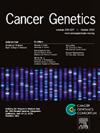34.确定变体规范化的挑战
IF 1.4
4区 医学
Q4 GENETICS & HEREDITY
引用次数: 0
摘要
基因组医学依赖于从多个来源收集信息,为患者做出最佳治疗和诊断决定。然而,在进行变异解释时,整合这些信息是一个主要瓶颈。不一致的格式(如 HGVS 和 SPDI)和变异背景(基因组和蛋白质组)等挑战增加了制定和传达完整变异解释所需的时间和精力。为了更清楚地了解不同资源之间在变异表述方面的差异,我们采用归一化协议对《癌症变异临床解读》(CIViC)、《分子肿瘤学年鉴》(MOAlmanac)和《ClinVar》中的变异进行了评估。在知识库中,53% 的 CIViC 变异、42% 的 MOAlmanac 变异和 99% 的 ClinVar 变异已成功归一化。我们对仍需采用归一化方法的其余变异进行了分类评估,并分析了这些变异对临床的影响。基因融合(如 "ALK G1202R")和区域定义变异类别(如 "3′ UTR 突变")分别占所有未归一化变异的 16% 和 10%,并被认为具有最大的潜在临床影响。此外,在 CIViC 和 MOAlmanac 中与未归一化变异相关的所有证据项目中,融合变异占 25%,这说明了融合变异在整个群体中的重要性。变异归一化器是一个开源工具包,可用于独立数据集,以促进知识库中的证据与基因组变异数据的精确匹配。本文章由计算机程序翻译,如有差异,请以英文原文为准。
34. Identifying challenges in variant normalization
Genomic medicine relies on collecting information from multiple sources to make optimal therapeutic and diagnostic decisions for the patient. However, integration of this information, at the time of variant interpretation, is a major bottleneck. Challenges including inconsistent formats (e.g. HGVS and SPDI), and variant contexts (genome and proteome), increase the time and effort required to formulate and communicate a complete variant interpretation. To more clearly understand inter-resource differences in variant representation, variants from the Clinical Interpretations of Variants in Cancer (CIViC), Molecular Oncology Almanac (MOAlmanac), and ClinVar were evaluated using a normalization protocol. Of the variants in the knowledgebases, ∼53% of the CIViC, ∼42% of the MOAlmanac, and ∼99% of ClinVar variants were successfully normalized. We categorically assessed remaining variants for which normalization methods are still needed, and analyzed these for clinical impact. Gene fusion (e.g. 'ALK G1202R') and region-defined variant categories (e.g. '3′ UTR Mutations') respectively constitute 16% and 10% of all the variants that were not normalized, and were found to hold the greatest potential clinical impact. Additionally, fusion variants are responsible for ∼25% of all of the evidence items associated with not normalized variants from CIViC and MOAlmanac, illustrating the weight that fusion variants carry in the overall group. The Variation Normalizer is an open-source toolkit and is available for use with independent data sets to facilitate precise matching of evidence from knowledgebases to genomic variant data.
求助全文
通过发布文献求助,成功后即可免费获取论文全文。
去求助
来源期刊

Cancer Genetics
ONCOLOGY-GENETICS & HEREDITY
CiteScore
3.20
自引率
5.30%
发文量
167
审稿时长
27 days
期刊介绍:
The aim of Cancer Genetics is to publish high quality scientific papers on the cellular, genetic and molecular aspects of cancer, including cancer predisposition and clinical diagnostic applications. Specific areas of interest include descriptions of new chromosomal, molecular or epigenetic alterations in benign and malignant diseases; novel laboratory approaches for identification and characterization of chromosomal rearrangements or genomic alterations in cancer cells; correlation of genetic changes with pathology and clinical presentation; and the molecular genetics of cancer predisposition. To reach a basic science and clinical multidisciplinary audience, we welcome original full-length articles, reviews, meeting summaries, brief reports, and letters to the editor.
 求助内容:
求助内容: 应助结果提醒方式:
应助结果提醒方式:


